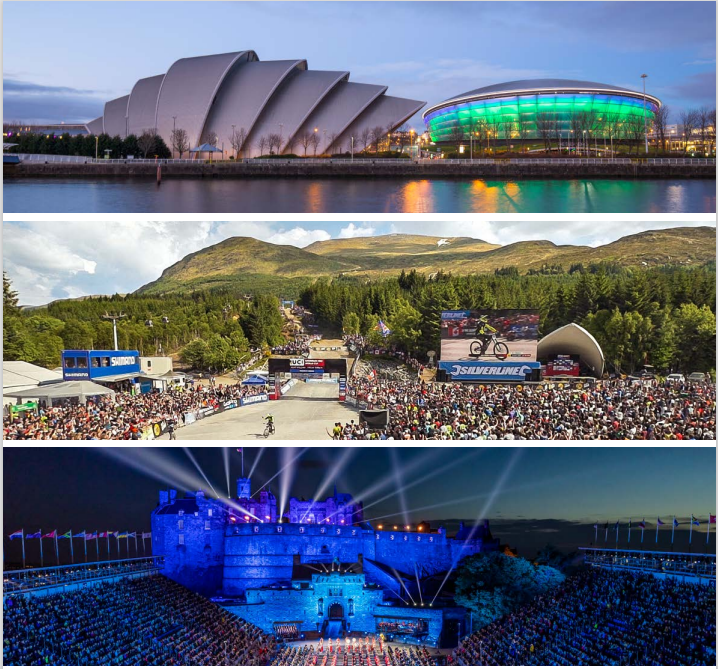
Scotland’s national events boss has warned that the industry must “tackle” concerns over security as well transparency and governance around bidding for major events.
Paul Bush OBE, VisitScotland’s Director of Events, highlighted the impact of raised threat levels to national security on events, in the wake of the terror attacks on UK soil in 2017, as well as corruption scandals which have affected public confidence in high-profile international sporting spectacles.
Speaking at the National Events Conference: Setting the Stage for 2025, Bush, former Chef De Mission for The Scottish Commonwealth Games team, said: “While it is an exciting time for the industry with all the technological advancements and the rise in social media allowing events and audiences to be more engaged, it is also a very challenging time.
“The current security climate, the transparency and governance around the bid process, as well doping and corruption in sport, are adversely affecting the confidence the public has in bidding for and delivering of major events. As a global industry we must be willing to tackle it head on if we are to maintain public support for major events around the world.”
More than 300 events professionals gathered together on Monday to hear about the latest industry best practice as well as take learnings from global event experts.
Canadian audience research expert David Coletto, who is reportedly close to Canadian Prime Minister Justin Trudeau, topped the bill with his insights into how the events industry needs to adapt to the changing tastes of the so-called ‘Millennials generation’.
Coletto presented an optimistic view of how the events industry stands to benefit from an ‘experience driven’ generation – those born between 1980 and 2000 – who make up a quarter of the population.
“The great news for all of you in the events and tourism business is that I don’t think there’s been a better time to be in this business given what I’m about to share with you, the craving, the desire that our generation, my generation, has for experiences. If you give us and offer us an exciting experience that kindles our senses, you will be successful; because our lives are incredibly saturated with digital content we look for experiences we can get with people, actual real people,” he said.
Research shared at the conference showed that food and drink as well as travel are the top two priorities of the Millennials generation, and that events that attend to those desires, and somehow manage to co-opt them into their programmes, stand to benefit.
Coletto framed their motivations as the ‘Do’ versus the ‘Have’ generation, highlighting their demand for ‘experience over possessions’. He pointed to four factors in particular which can act as key differentiators for events marketers: if events embody quality, are authentic, natural and value for money, then they will appeal to millennials.
He added: “The needs of the millennial generation compared to those of previous generations are so different. We are often described as the experiential obsessed generation and it is this generational change that is disrupting so many markets, including the events and festivals sector. With millennials currently representing a quarter of the population in countries across the world, whether it be Scotland, the UK, American or Canada, it is a key market that represents great opportunity for the industry, so understanding the change and harnessing it to your advantage is vital if you want to succeed in attracting and retaining a millennial audience for your event.”
Forty-two experts contributed to the one-day events industry forum, held every two years, at Strathclyde’s Technology Innovation Centre (TIC) on Monday. In addition to the opening and closing plenaries, the day was divided into 11 break-out sessions which provided further opportunities for the industry to delve into the latest trends and issues facing the sector, with: EventImpacts, the National Culture Strategy Consultation, Event Tech, Social Media as well as Security, Stewarding and Policing. EventsBase will feature some of the key points emerging from those sessions in forthcoming posts.
The closing session – Scotland’s Assets & The Perfect Stage – featured contributions from Jean Cameron, Bid Director of Paisley’s bid to become UK City of Culture in 2021 and Philip Long, Director of V&A Dundee, which is set to transform the city with the opening of Scotland’s first museum of design next year.
Picture Copyright Chris Watt


![Tickets on sale for Scotland's national events conference 2024 EventScotland_(600×300)[1]](https://eventsbase.co.uk/wp-content/uploads/2024/01/EventScotland_600x3001.png)
![mia launches peer groups to tackle industry issues and opportunities mia_600x300[1]](https://eventsbase.co.uk/wp-content/uploads/2024/01/mia_600x3001.png)
